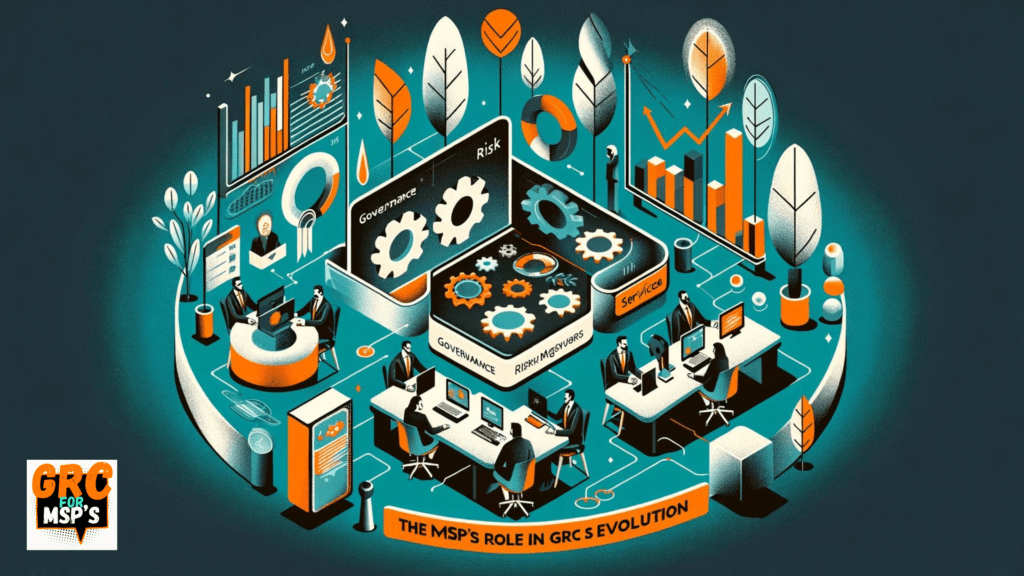Governance, risk management, and compliance (GRC) are critical aspects of managing a successful managed services provider (MSP) business. As technological advancements continue to reshape business landscapes, MSPs must anticipate and adapt to a rapidly evolving GRC landscape. This particularly involves understanding how regulations, risk management frameworks, and corporate governance models are changing in response to new digital threats, increasing compliance requirements, and the demand for sustainable business practices.

To remain competitive and resilient, MSPs must embrace the integration of GRC into their strategic thinking and service offerings. The ongoing shifts in the regulatory environment, coupled with an increased focus on sustainability, mean that MSPs need to not only ensure compliance but also build enduring systems that can adapt to unforeseen challenges. Predictive analytics and forward-thinking cybersecurity measures are becoming more critical than ever, requiring MSPs to stay ahead of trends and be proactive in their risk management strategies.
Key Takeaways
- GRC integration is vital for MSPs to manage emerging risks and compliance challenges.
- Strategic foresight and sustainability are becoming central to MSP operations.
- Advanced analytics and proactive measures are key to future-proofing MSP services.
Evolving Role of GRC in the Digital Age
In the digital era, Governance, Risk Management, and Compliance (GRC) play a pivotal role in shaping business strategies. These facets are integral to management decisions as they navigate technological advancements and the associated risks.
Harnessing AI and Machine Learning
Organisations are increasingly integrating AI and machine learning into their GRC processes to enhance decision-making and predictive analytics. This digital transformation allows for more sophisticated risk detection, with algorithms that can analyse vast datasets quicker and more accurately than humans. Businesses utilise machine learning models to forecast potential compliance issues, optimising GRC efforts and promptly addressing challenges.
Adapting to Cyber Threats and Cybersecurity Trends
Adaption to cyber threats is a continuous process, with GRC frameworks evolving alongside emerging cybersecurity trends. Organisations employ advanced technology to defend against cyber risks, regularly updating their risk management strategies to reflect the changing digital landscape. This includes real-time threat detection and automating responses to security incidents, ensuring that compliance with regulatory standards is maintained.
Expanding GRC Beyond Traditional Boundaries

GRC is expanding beyond its traditional confines, moving into larger digital ecosystems. As organisations transform digitally, GRC must also traverse into new realms like cloud computing, social media, and IoT devices. This expansion demands that compliance is not solely a checkbox exercise but is embedded within every aspect of new technology deployment and digital initiative.
Strategic Integration and Risk Management
In the dynamic landscape of Managed Service Providers (MSPs), a strategic alignment between governance, risk management, and compliance (GRC) and business objectives is crucial. MSPs need to enhance their risk assessment and management processes to gain better risk insights and ensure informed decision-making.
Integrating GRC with Business Strategy
Effective integration of GRC frameworks with business strategies is fundamental for MSPs. It involves the alignment of risk management processes with the strategic objectives of a business. This approach ensures that risk management is not a separate function but rather an integral component of all business activities. By embedding GRC into the strategic planning phase, organisations can prioritise risks in accordance with their risk appetite and ensure that their risk management efforts are in direct support of their business goals.
To illuminate this integration:
- Risk Insights: Businesses gain valuable insights by incorporating risk perspectives into their strategic plans, leading to more resilient strategies.
- GRC Alignment: There is a seamless alignment between governance controls and business objectives, ensuring compliance and risk mitigation are well-coordinated with growth and performance targets.
Enhancing Risk Assessment and Management
For MSPs, the enhancement of risk assessment and management is an ongoing imperative. Utilising robust risk assessment frameworks, businesses can identify potential threats and vulnerabilities more effectively and establish appropriate measures to manage these risks.
Key aspects include:
- Continuous Monitoring: Regularly updating risk assessments to reflect the ever-changing security landscape, thereby maintaining a dynamic and pre-emptive risk management posture.
- Risk Management Processes: Implementing structured and consistent processes that are regularly reviewed and improved upon, tailoring them to suit the organisation’s evolving risk profile and the broader industry context.
Businesses that instil these practices into their operational ethos not only safeguard their assets but also forge a path towards sustainable and secure growth.
Sustainability and Resilience Focus
MSPs (Managed Service Providers) must evolve their GRC (Governance, Risk, and Compliance) frameworks to integrate a strong focus on sustainability and resilience. By embedding ESG (Environmental, Social, and Governance) factors and prioritising operational and business resilience, they ensure agility in a rapidly changing environment.
Incorporating ESG into GRC Frameworks
Managed Service Providers are recognising the need to embed ESG considerations directly into their GRC strategies. Environmental stewardship, social responsibility, and strong governance are no longer ancillary concerns; they are front and centre in the risk assessment processes. The incorporation of ESG allows MSPs to address non-financial risks that could have significant impacts on their reputation and operational efficiency. For example, an MSP’s approach to reducing their carbon footprint is a reflection of their commitment to environmental sustainability.
Building Resilience and Agility
Business and operational resilience are crucial for MSPs to thrive in the face of disruptions. Resiliency planning involves identifying potential risks to service continuity and implementing proactive strategies to mitigate those risks. Agility, on the other hand, pertains to an MSP’s ability to rapidly adapt and respond to changes without significant setbacks. For instance, adopting cloud services can enhance an MSP’s business resilience, providing scalable solutions that support resilience in a variety of operational scenarios. Building a resilient and agile infrastructure means an MSP can bounce back from challenges while maintaining a seamless service offering to their clients.
The MSP’s Role in GRC Evolution

Managed Service Providers (MSPs) are integral in shaping the future of Governance, Risk, and Compliance (GRC), especially as technology evolves and the perimeter of risk management extends beyond the traditional enterprise.
Challenges and Opportunities for MSPs
Challenges:
The evolving landscape of GRC presents numerous challenges for MSPs, most notably in adapting their services to meet the complex regulatory environments. They must maintain a robust understanding of compliance requirements across various industries to offer effective managed services. This necessity is compounded by the increasing scope of cyber threats, demanding more stringent security protocols and risk management strategies.
Opportunities:
Conversely, these challenges present opportunities for MSPs to enhance their service offerings. By incorporating advanced technology solutions that prioritise risk management and compliance, MSPs can position themselves as indispensable partners to the extended enterprise. Engagement and collaboration with clients provide a pathway to tailor strategies that align with specific GRC needs while fostering a culture of continuous improvement.
Through proactive engagement, MSPs have the potential to facilitate a more collaborative ecosystem, one where managed services enable businesses to not only meet but exceed their GRC objectives. This evolution positions MSPs not just as outsourced help, but as strategic advisors in the forefront of GRC innovation.
Regulatory Environment and Compliance Dynamics
Managed Service Providers (MSPs) must adapt to an evolving regulatory environment that increasingly demands robust compliance management. These changes are not only expansive and complex, but also carry significant penalties for non-compliance.
Navigating the Complex Regulatory Landscape
Compliance teams are grappling with a matrix of regulations that span multiple jurisdictions. MSPs must understand and adhere to frameworks that dictate the levels of governance, risk management, and compliance required within their operations. Rapid regulatory changes necessitate continual adaptation to conform with new and updated laws which can result in substantial fines for breaches.
Frameworks such as the new Digital Operational Resilience Act (DORA) specify stringent requirements to enhance the overall resilience of digital operations within the financial sector.
Digital Operational Resilience Act (DORA) and Beyond
The introduction of DORA indicates a strategic move towards unifying digital operational resilience regulations across the EU. While not directly applicable in Australia, the principles of DORA resonate globally, emphasizing the importance of protecting critical ICT services against disruptions.
For Australian MSPs, the core themes of DORA serve as a valuable guide for structuring operational resilience despite the act’s regional focus. They need to align their compliance strategies with the regulatory environment influenced by such landmark acts to mitigate risks related to digital operational disruptions.
Emerging Trends and Predictive Insights

In this section, we explore specific trends in Governance, Risk, and Compliance (GRC) that Managed Service Providers (MSPs) should be aware of. These trends are centred on refining risk management techniques and adapting to global changes affecting GRC strategies.
Quantifying Risks and Third-Party Risk Management (TPRM)
MSPs are now recognising the necessity of quantifying non-financial risks to enhance their risk management programs. Tools provided by companies like Metricstream facilitate this process by turning qualitative assessments into quantitative data. This approach aids organisations not only in measuring risks in monetary terms but also in prioritising their mitigation efforts.
Third-party risk management (TPRM) is becoming a top-tier priority. Organisations increasingly depend on external vendors, which introduces multiple points of vulnerability into their operational frameworks. Robust TPRM practices are essential for evaluating and mitigating risks associated with third-party entities, ensuring both compliance and a competitive edge in a tightly connected marketplace.
GRC Trends in Response to Geopolitical and Economic Shifts
The flux in geopolitical tensions and economic conditions directly influences regulatory changes and, consequently, GRC trends. MSPs should stay vigilant about the evolving landscape to help their clients navigate these complexities. The ability to adapt to regulatory change efficiently can set an organisation apart from its competitors.
Due to these shifts, GRC strategies are dynamically evolving. They incorporate not just compliance with current regulations but also a forward-looking approach to potential geopolitical and economic disruptions. This proactive stance supports organisations in maintaining resilience against unforeseen challenges, ensuring long-term sustainability.
Frequently Asked Questions
This section addresses common queries about the progression of Governance, Risk Management, and Compliance (GRC) procedures for Managed Service Providers (MSPs), focusing on upcoming trends, technological influences, regulatory developments, and the evolving skills needed in the GRC space.
How is the GRC landscape expected to evolve for Managed Service Providers in the coming years?
The GRC landscape for MSPs is projected to focus heavily on enhancing cybersecurity defences and adapting to new standards such as ISO/IEC 27001:2022. MSPs will need to keep pace with these changes to ensure robust GRC strategies.
What trends should MSPs be aware of in the ever-changing GRC domain?
MSPs should be cognisant of trends including a heavier emphasis on non-financial risk management and quantification of such risks, alongside a prioritisation on third-party risk analysis. Acknowledging these trends is crucial for proactive GRC planning.
How will advancements in technology shape the GRC roles within MSP organisations?
Technological advancements are expected to automate and streamline GRC processes, necessitating skills in managing and integrating these solutions. MSPs will need individuals who can leverage technology to enhance GRC efficiency and effectiveness.
In what ways are regulatory changes anticipated to impact GRC strategies for MSPs?
Regulatory changes, such as updates to the Information Security Manual (ISM) in December 2023, are anticipated to mandate more stringent controls and reporting requirements. MSPs will have to adapt their GRC strategies to comply with these evolving regulations.
What new competencies will be required from GRC professionals in the context of MSP operations?
GRC professionals will need competencies that include understanding new compliance standards and cybersecurity frameworks, data analytics, and the ability to interpret and implement regulatory changes into GRC practices within MSPs.
How might integration of artificial intelligence in GRC systems benefit Managed Service Providers?
Artificial intelligence in GRC systems can provide MSPs with predictive analytics, risk assessment capabilities, and the automation of compliance tasks. This integration can lead to more informed decision-making and resource allocation for MSPs.

